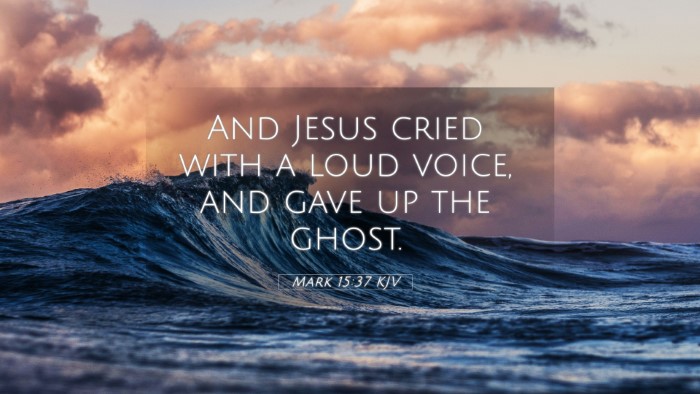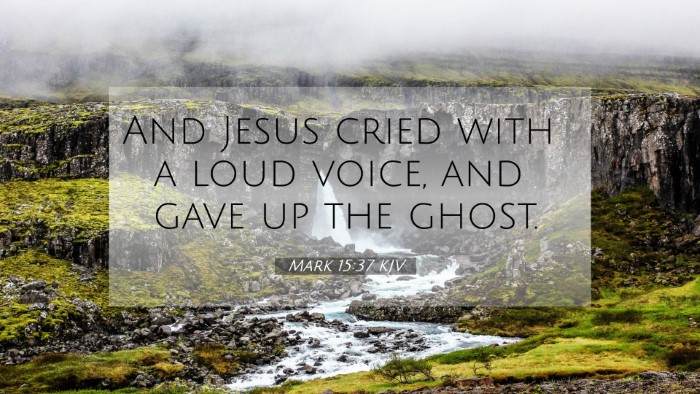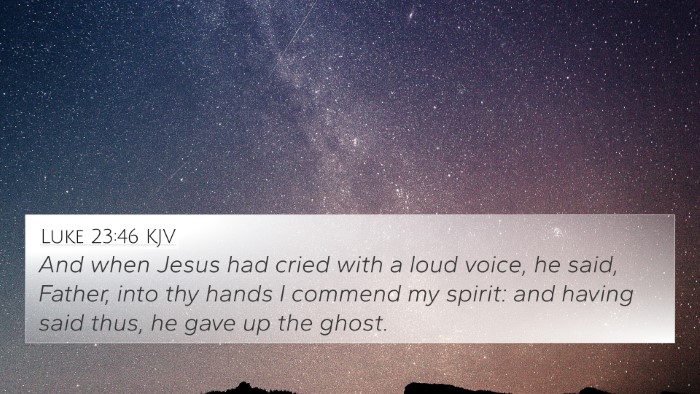Understanding Mark 15:37
Mark 15:37 states, "And Jesus cried out with a loud voice, and breathed his last." This verse marks a significant moment in the New Testament, capturing the very moment of Jesus' death. This event carries deep theological implications and is integral to the Christian faith. In this summary, we explore the interpretations of this verse as derived from public domain commentaries, including those by Matthew Henry, Albert Barnes, and Adam Clarke.
Contextual Background
Before delving into the specifics of Mark 15:37, it is essential to consider the surrounding context. This verse is part of the passion narrative where the suffering and crucifixion of Jesus are depicted. The events leading up to His crucifixion involved trials, beatings, and mocking, all of which set the stage for this climactic moment.
Interpretations and Insights
-
Matthew Henry's Commentary:
Henry emphasizes the profound nature of Jesus' final cry, suggesting it was not just a surrender but a declaration of fulfillment. Jesus' last words signify the completion of His mission to atone for humanity's sins. The loudness with which He cried reflects the depth of His emotion and significance of His sacrifice.
-
Albert Barnes' Notes:
Barnes discusses the importance of the phrase "breathed his last," interpreting it as a demonstration of Jesus’ humanity. He points out that at the moment of death, a great veil was rent, symbolizing the new covenant established through Jesus’ sacrifice and access to God afforded to believers.
-
Adam Clarke's Commentary:
Clarke highlights the dramatic nature of Christ's last moments. He reflects on how this loud cry signifies not a defeat, but a victorious proclamation; Jesus fulfilled the prophecies regarding the Messiah, linking His death with themes of salvation throughout Scripture. Clarke notes the fulfillment of Isaiah 53 in this moment.
Significance of Jesus' Last Words
The cry of Jesus is rich in meaning. It can be viewed as a final declaration of His role as the Savior. Each commentator interprets this in a way that highlights both the sorrow of the moment and the profound victory that His death represents for believers.
Bible Cross References
Mark 15:37 is cross-referenced with several important scripture passages that enhance its meanings and provide a broader understanding of Jesus' crucifixion:
- Matthew 27:50: "And Jesus cried out again with a loud voice and yielded up his spirit." This passage parallels Mark's account and underscores the significance of Jesus’ death.
- Luke 23:46: "Then Jesus, calling out with a loud voice, said, 'Father, into your hands I commit my spirit!' And having said this he breathed his last." This connection highlights Jesus' faithfulness to God even in death.
- John 19:30: "When Jesus had received the sour wine, he said, 'It is finished,' and he bowed his head and gave up his spirit." This verse emphasizes the completion of Jesus’ earthly mission.
- Isaiah 53:5: "But he was wounded for our transgressions; he was crushed for our iniquities; upon him was the chastisement that brought us peace, and with his stripes we are healed." This Old Testament prophecy connects to the significance of Jesus’ sacrificial death.
- Hebrews 10:19-20: "Therefore, brothers, since we have confidence to enter the holy places by the blood of Jesus, by the new and living way that he opened for us through the curtain, that is, through his flesh." This explains the result of Jesus' death for believers in terms of access to God.
- 1 Peter 2:24: "He himself bore our sins in his body on the tree, that we might die to sin and live to righteousness. By his wounds you have been healed." This scripture ties the redemptive purpose of Jesus' death to the healing of believers.
- Romans 5:6: "For while we were still weak, at the right time Christ died for the ungodly." This verse connects to the sacrificial nature of Jesus' death, demonstrating His role as advocate for the sinner.
- Colossians 2:14: "By canceling the record of debt that stood against us with its legal demands. This he set aside, nailing it to the cross." This illustrates the theological impact of the crucifixion.
- Revelation 21:4: "He will wipe away every tear from their eyes, and death shall be no more, neither shall there be mourning, nor crying, nor pain anymore, for the former things have passed away." This emphasizes the future hope provided through Christ’s death.
Thematic Connections
Thematically, Mark 15:37 connects with a multitude of Bible verses that discuss sacrifice, redemption, and the fulfillment of God's promises:
- The Sacrificial System: Connections can be drawn between this verse and the Old Testament sacrificial system, which foreshadowed Jesus as the ultimate sacrifice.
- The New Covenant: This event signifies the ushering in of a new covenant, as referenced in passages like Jeremiah 31:31.
- God’s Sovereignty: The death of Jesus is also tied to the themes of God’s sovereignty and His plan for humanity’s redemption.
Cross-Referencing Biblical Texts
When studying Mark 15:37, engaging in cross-referencing with other scriptures is essential. Tools like a Bible concordance or Bible cross-reference guide can greatly assist in locating thematic connections. Understanding the relationships between these verses enhances deeper biblical studies and provides clarity for sermon preparation or personal reflection.
Conclusion
Mark 15:37 encapsulates the finality of Jesus' earthly ministry and His ultimate sacrifice for humanity. Through insights from Matthew Henry, Albert Barnes, and Adam Clarke, along with scriptural cross-references, we gain a comprehensive understanding of the importance of this moment. As believers reflect on this verse, it offers both solemnity and hope, marking the transformative power of Jesus' death and its significance in the larger narrative of redemption.





